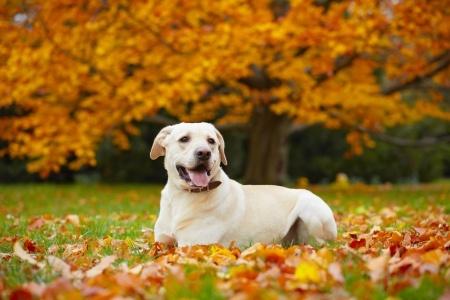As a dog lover and owner, you want your Labrador pup to live a long and comfortable life. Your Labrador quickly becomes part of the family and it is key to keep your new family member in great shape by taking him or her to the vet for check-ups and getting all the necessary vaccines and routine health screenings. As your friendly companion ages, though, there are important signs to watch for to ensure he or she stays healthy.
Obesity
Good diet and exercise is the key to preventing many diseases and illnesses with your Lab. That why it’s important to resist the urge to sneak your dog extra treats or table scraps, even when that adorable face looks up at you with those puppy-dog eyes begging for more food. In addition to avoiding “people” food, be sure to measure every meal and don’t give too many treats. Be careful if this means adjusting down the current food intake as changes in diet can be difficult with elder dogs. Keep an eye on your sneaky pooch, too, as in those situations, he or she may go for the garbage or your child’s favorite toy.
 Hip Dysplasia
Hip Dysplasia
Hip dysplasia is a genetic disease where the hip joint and thighbone don’t fit correctly. The biggest sign is lameness in the Lab’s rear legs. If you see these signs in your dog, go to the vet for an X-ray as this is the best way to diagnose the disease. While dogs with hip dysplasia shouldn’t be bred to help prevent the disease from continuing through future generations, buying from a responsible breeder is the easiest way to avoid this disease. You should always ask the breeder who you purchase your Lab from if they have a hip guarantee, as experienced breeders will have worked to eliminate this problem from their dogs’ genetic line.
Cataracts and Progressive Retinal Atrophy (PRA)
You may notice problems with your Lab’s eyesight as he or she ages. Cataracts, or cloudy spots on your dog’s eye, can cause vision loss. Although these can be surgically removed, it is important to speak with your breeder about any known hereditary eye diseases in their genetic lineage. Other problems can include the deterioration of your Lab’s retina. Known as progressive retinal atrophy (PRA), this disease can cause your dog to become night blind, or lose all vision. If your pup is showing signs of vision problems, consult with your vet for the best course of action.
Epilepsy
If you notice your Lab exhibiting strange behaviors like hiding, swaying or running like he or she is being chased, it could be caused by mild or severe epileptic seizures, says Dogtime.com. Although it can be frightening to witness your dog having a seizure, keep in mind that epilepsy may be caused by many things. This is why any strange activities should be discussed with your veterinarian to diagnose the issue and determine the best way to address the issue.
Laryngeal Paralysis
Noisy breathing and tiring quickly during exercise are the main signs that your Lab may have laryngeal paralysis. This condition paralyzes the muscles in the voice box, making it very difficult for the Lab to breathe. If you notice any breathing problems or shortness of breath in your dog, take him or her to the vet right away since surgical treatment may be required.
Gastric Dilation-Volvulus (Bloat)
Older Labs are also susceptible to gastric dilation-volvulus, says Dogtime.com. This dangerous condition is most noticeable when your dog eats or drinks rapidly or takes part in intense exercise after eating. In these cases, your dog is unable to get rid of excess air in the stomach which can cause twisting internally and even shock. If you notice your dog has a swollen stomach, is excessively drooling or retching without vomiting, schedule an appointment with your vet as soon as possible.
Whether you’re looking for your first pup or your next Lab to join the family, Lankas Labs has beautiful dogs just waiting for their forever homes. Find out about our upcoming litters online now or contact us today by calling 785-626-9313.

